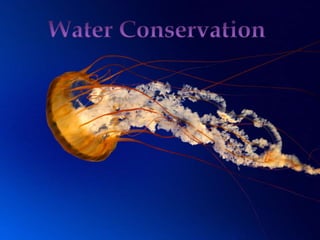Water conservation evm
- 2.  Water pollution is the contamination of water bodies. Water pollution occurs when pollutants are discharged directly or indirectly into water bodies without adequate treatment to remove harmful compounds.
- 3.  Showers that go on too long.  Baths that are too big and filled with too much water.  Leaking pipes and dripping faucets.  Using washing machines and dishwashers for just a few things.  Leaving the water running when you are brushing your teeth.  Using a big old cistern for your toilet instead of a dual flush.  Watering your garden in the heat of the day when the spray evaporates.  Washing your car with a hose instead of a bucket.
- 4.  In this process the divers go inside the oceans and poisons the coral reefs. The fish comes and eat the poison because of which they die. The poison also effects the water and makes it impure.
- 5.  There is one more way in which water is wasted that is bomb fishing. In this process a bomb is thrown in the river to kill fishes and collect them. But because of this the fish are dying and also the water is been polluted.
- 6.  A number of waterborne diseases are produced by the pathogens present in polluted water, affecting humans and animals alike.  Polluted municipal water supplies are found to pose a threat to the health of people using them.  As per the records, about 14000 people perish or incur various communicable diseases due to the consumption of contaminated drinking water.  Marine life becomes deteriorated due to water pollution. Lethal killing of fish and aquatic plants in rivers, oceans and seas is an aftereffect of water .
- 7.  Three fourth of earth consists of water, but only 3% of it is fresh water and only 1% is available. It is this fresh water that we need to drink, wash, irrigate farms etc.  Water conservation is important because we need drinking water and we need some of the animals that live in water.
- 8.  Do a bucket and mug bath.  Fix leaky taps.  Take shorter showers in case you don’t want to do a bucket and mug bath.  Harvest rain water at home.  Use minimum dishes.  Use bore water in toilets.  Use low water storage flush toilets.
- 9.  Cover the swimming pool while not in use.  Close the hose.  Irrigate Wisely.  Educate illiterate people how to conserve water.  Harvest rain water in societies.  Create awareness among people.  There should be right pressure in pipes.  Repair the common pipes which are leaking.  Use recyclable ganpatis while visarjan.
- 10.  Rainwater harvesting is the accumulating and storing of rainwater for reuse before it reaches the aquifer. It has been used to provide drinking water, water for livestock, water for irrigation, as well as other typical uses. Rainwater collected from the roofs of houses and local institutions can make an important contribution to the availability of drinking water.
- 12.  You will rob water instead of jewellery.
- 13.  You will have to cut your hair so that you will save water.  You will allowed to drink only a glass of water a day.  You will be allowed to take a 5 min slower only.  There will be less rains.  The cost of drinking water would be in thousands.  The poor would be helpless and will have to drink unpurified water which can lead to diseases or even to death.














